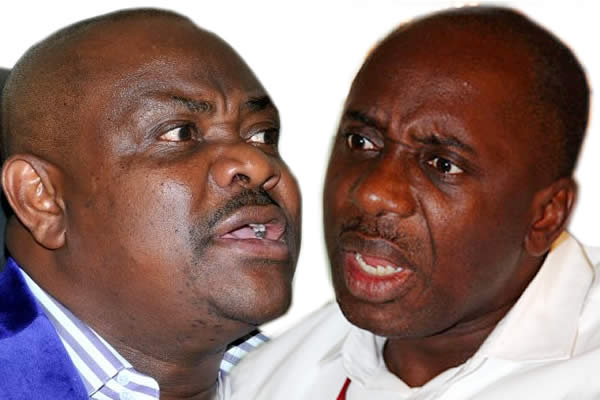Paragraph 1: The Genesis of the War of Words
The political landscape of Nigeria is often characterized by verbal sparring between prominent figures, and a recent exchange between Nyesom Wike, the Minister of the Federal Capital Territory, and Rotimi Amaechi, the former Minister of Transportation, exemplifies this trend. The controversy erupted following comments made by Amaechi during his 60th birthday celebration, where he lamented the state of the Nigerian economy, stating, "We’re all hungry, all of us are." This seemingly innocuous remark ignited a fiery response from Wike, who accused Amaechi of being "hungry for power," not food. This public disagreement between the two former governors of Rivers State underscores the deep-seated political rivalries that often play out on the national stage.
Paragraph 2: Wike’s Critique of Amaechi’s "Hunger" Claim
Wike’s criticism of Amaechi’s statement centered on the latter’s long and prominent career in Nigerian politics. He highlighted Amaechi’s trajectory from Speaker of the Rivers State House of Assembly (1999-2007) to Governor (2007-2015) and subsequently Minister of Transportation (2015-2023). Wike questioned the timing of Amaechi’s "hunger" claim, emphasizing that he had never expressed such concerns during his years in power. This, according to Wike, exposed the true nature of Amaechi’s hunger – a hunger not for food, but for a return to political influence and power. Wike framed Amaechi’s statement as a political ploy, a desperate attempt to regain relevance after being out of office.
Paragraph 3: The Political Subtext of the Exchange
The exchange between Wike and Amaechi extends beyond a mere disagreement over the interpretation of a single statement. It reveals the complex web of political alliances and rivalries that shape Nigerian politics. Amaechi, having served as the Director-General of President Buhari’s campaign, now finds himself in the opposition camp. This shift in allegiance, coupled with his "hunger" remark, suggests a desire to challenge the current administration. Wike, on the other hand, has aligned himself with the ruling party and portrays himself as a key figure in ensuring President Tinubu’s re-election. The verbal clash, therefore, represents a proxy war between these two political heavyweights, each vying for influence and positioning themselves for future political endeavors.
Paragraph 4: Wike’s Dismissal of Amaechi’s Political Maneuvers
Wike further dismissed Amaechi’s statement, suggesting that it was a thinly veiled attempt to mobilize opposition against the current administration. He questioned the means by which Amaechi planned to "remove" the president, implying that such language hinted at unconstitutional methods. By linking Amaechi’s words to the idea of a coup, Wike attempted to discredit his opponent and paint him as a threat to democratic processes. He also challenged Amaechi’s ability to garner support, pointing to his failure to secure significant votes for Buhari in Rivers State during past elections, despite his prominent role in the campaign.
Paragraph 5: Wike’s Self-Portrayal as a Political Asset
In contrast to Amaechi’s perceived desperation, Wike presented himself as a valuable political asset. He emphasized his commitment to President Tinubu’s success and his confidence in contributing to a second term victory. This self-promotion served to further distance himself from Amaechi, highlighting their contrasting political trajectories. Wike’s declaration of being an "asset" underscores his strategic positioning within the ruling party and his ambition to remain a key player in Nigerian politics. He implicitly contrasted this with Amaechi’s current position outside the corridors of power.
Paragraph 6: The Broader Implications of the Wike-Amaechi Feud
The public spat between Wike and Amaechi provides a window into the dynamics of Nigerian politics. It reveals the enduring personal rivalries that often underpin political maneuvering. Beyond the immediate exchange, the conflict speaks to broader issues of political power, access to resources, and the struggle for influence within the Nigerian political system. The rhetoric employed by both sides highlights the high stakes involved and the lengths to which politicians will go to assert their dominance and secure their political futures. Their contrasting narratives – one of hunger for power, the other of unwavering support for the incumbent – reflect the ongoing struggle for control and the ever-shifting alliances that characterize the Nigerian political arena.


